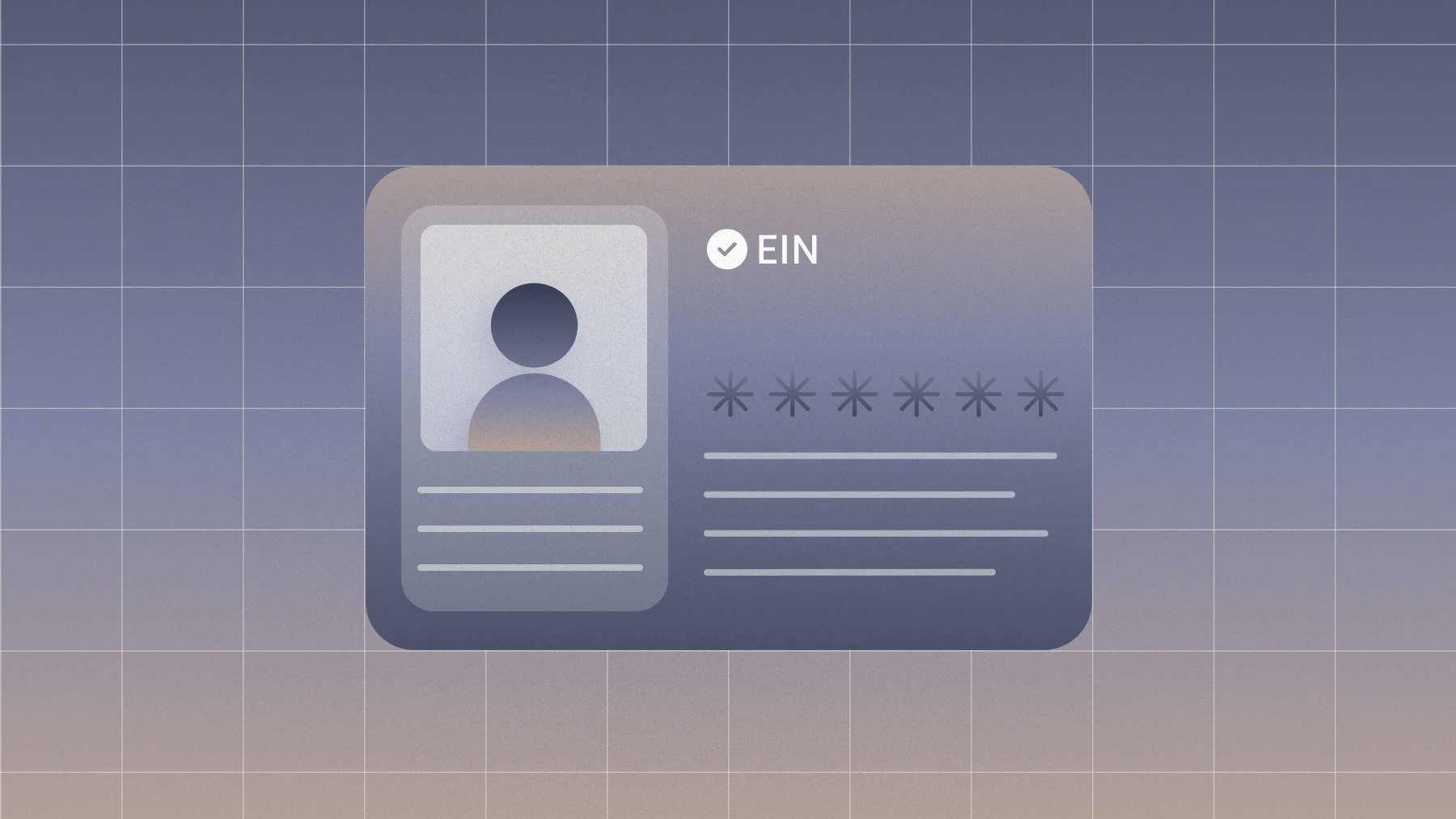Why you need an employer identification number (EIN) and how to get one

If you’re thinking about starting a company, you’ve probably heard that you need an Employer Identification Number (EIN). Startups use EINs for everything from applying for business banking services to filing tax returns. In this article, we’ll outline all of the possible applications for an EIN and explore when, why, and how your business can apply for one.
What is an employer identification number (EIN)?
By definition, an Employer Identification Number (EIN), also known as a Federal Tax Identification Number, is a unique nine-digit number used by the Internal Revenue Service (IRS) to identify your business for tax purposes. Employers often use EINs to file tax returns.
The way an EIN functions for your business is similar to how a Social Security number (SSN) functions for you as an individual — they’re both considered tax identification numbers (TINs), which are any numbers the IRS can use to identify a tax entity. One key difference is that unlike SSNs, EINs are not considered sensitive information and can be shared in public forums and publications. In fact, you may sometimes need to share your EIN with other businesses, such as with vendors who need your EIN for contractor payments.
Why and when do you need an EIN?
EINs can offer everything from the ability to bank to the assurance that your personal finances are safe from corporate debts. Here are some scenarios you may find yourself using an EIN for your business:
Applying for a business bank account
Most financial institutions require an EIN to open a business bank account, as well as to access other business services like loans, licensing, and corporate credit cards. Business bank accounts can separate your professional and personal finances, and provide a degree of social proof to professional contacts that your company is legitimate.
Hiring and paying employees
While you don’t need employees to have an EIN, you definitely need an EIN in order to hire employees or contractors. You’ll also need an EIN to pay them — you won’t be able to set up a payroll service without one since all payroll-related reports contain your EIN, which includes monthly, quarterly, and yearly tax forms.
In terms of taxes, employers are required to issue employee-related tax forms, such as W-2s, at the conclusion of each tax year. Your employees will also need your EIN when filing their own tax returns.
Protecting your personal finances
The legal separation between a corporate entity and its business owners is known as the corporate veil. A strong corporate veil separates your business and personal taxes and can protect you against business liabilities — this veil is not impenetrable, however, it can grow stronger with more fortifications. An EIN is one such fortification because it adds additional separations for tax filing and identification between a business and its beneficial owners.
Maintaining your personal privacy
When your business has a distinct identity separate from your own, it creates a safe distance between you and your company, reducing the possibility of your personal identity being compromised. This means that as a business owner, you’re able to avoid sharing your personal information via your business by using your EIN instead of providing your SSN.
For example, without separate identities, any time that a form asks you for a sole proprietor’s individual tax identification number (ITIN), you will have to provide your SSN, But with separate identities, you’ll be able to use your EIN instead.
The need for an EIN often changes as a company grows.
For founders in the pre-launch stage, an EIN is commonly required to open a business bank account, separate personal and company finances, and prepare for incorporation-related filings.
When a company begins hiring employees or contractors, an EIN becomes essential for payroll, employment tax filings, and reporting obligations. Many payroll providers also require an EIN before onboarding.
As businesses mature, EINs are used for additional purposes, including applying for business licenses, registering for state taxes, filing certain federal returns, and working with lenders or partners who require formal business identification.
Understanding when and why an EIN is needed helps founders avoid last-minute delays during critical setup moments.
What kind of organizations need an EIN?
Who needs an EIN? It depends on your business structure.
Single-member LLCs and sole proprietorships
Neither single-member LLCs nor sole proprietorships are required to get an EIN. They’re both comprised of only one founding individual, whose personal tax identification number (TIN) — most likely their SSN — will be used for business tax filings and identification purposes. That said, one-person companies can still opt for an EIN and reap the benefits, like having the ability to open a business bank account and protect their personal finances.
Multi-member LLCs and partnerships
Although multi-member LLCs and partnerships are distinct business structures, the IRS treats them identically when it comes to tax filing. Both structures require an EIN to operate because their owners must file a partnership return and provide K-1 forms to members of their LLC or partnership.
Non-profit organizations (NPOs)
Non-profit organizations (NPOs) are charitable organizations, meaning that they are tax-exempt. However, an EIN is needed to register for tax-exempt status through Form 990.
It’s important to note that the EIN that is issued to a non-profit organization is a separate matter from the organization actually obtaining tax-exempt status from the IRS. While the central organization can file for group tax exemption, each of its chapters has to have its own EIN.
Corporations, trusts, and estates
For the most part, corporations, trusts, and estates are all required to have an EIN to operate — the exception is that certain trusts, such as revocable trusts, don’t always need an EIN. Be sure to investigate whether your type of trust requires an EIN.
What are the requirements for an EIN?
There are some clear-cut requirements for getting an EIN, which make it easier to decide whether it’s the right time for your company to move into this operational phase.
You’ll need an EIN if:
- Your company has employees
- Your company operates as a C-corporation, S-corporation, LLC, or partnership
- Your company files employment taxes or excise taxes
- Your company withholds taxes on any income besides wages to someone who is not a U.S. resident
How do you get an EIN?
Applying for an EIN is completely free and relatively straightforward. Depending on whether you’re based in the U.S., you can complete the applications online, by phone, fax, or mail.
We’ve outlined the different processes for getting an EIN as a U.S. founder and as an international founder below.
Applying for an EIN as a U.S. founder
If you’re a U.S.-based founder, applying online through the IRS website is the simplest, fastest way to get an EIN — it only takes a few minutes. To do this, you need to have a U.S. office, agency, or legal residence.
Since the website doesn’t save your progress, the online EIN application must be completed in one sitting, so be sure to have your documentation on hand and set aside dedicated time to complete the application.
Head to the IRS online EIN application. It’ll ask you for your business structure, first with general umbrella terms like “corporation” before getting more specific as you go on.
- Here's a tip: Have your SSN on hand before you begin so that none of your progress gets lost — the page times out frequently for security purposes.
Select more specific details about your business structure, such as whether it is an S-corporation or a C-corporation. This tells the IRS which kind of tax filings to expect from your company.
- Here's a tip: If you’re not sure or need to confirm what your business type is, take a look at your company formation documents.
Indicate the reason why you’re getting an EIN, such as hiring an employee or opening a business bank account.
- Here's a tip:You’ll get an EIN immediately upon completing the form.
Enter your personal details as the responsible party, like whether or not you are the business owner or founder. This is where you’ll enter your SSN or other ITIN.
- Here's a tip: If you’re applying for an EIN on behalf of the responsible party, ensure you click the option to indicate that you’re a third party.
Applying for an EIN as an international founder
Founders outside the U.S. can still obtain an EIN, even if they don’t have a Social Security number (SSN) or Individual Taxpayer Identification Number (ITIN). The process is slightly different, but it’s common for international founders forming U.S. entities.
When completing IRS Form SS-4, foreign applicants should leave Line 7a blank and write “Foreign” on Line 7b, which asks for the responsible party’s SSN, ITIN, or EIN. The responsible party must still be an individual, but they are not required to have a U.S. tax ID.
Because the IRS online EIN application requires an SSN or ITIN, international founders typically apply by phone or fax. Phone applications are often the fastest option, and an EIN may be issued during the call if all information is complete. Processing times for faxed applications can take longer.
This pathway is commonly used by non-U.S. founders who need an EIN to open a U.S. bank account, set up payroll, or comply with U.S. tax filing requirements.
Complete an SS-4 form, which you can get instructions for here, and can complete here.
- Here's a tip: type directly into the form to ensure the best accuracy.
For the second step, you can either continue by phone, fax, or mail.
- By phone: Call 267-941-1099 to answer questions from the IRS regarding your SS-4 form and get your EIN while on the call. (The line is open Monday to Friday between 6am-11pm EST.)
- Here's a tip: This number is not toll-free and you may be on the phone for an hour or more. Consider using a web calling service to avoid international call fees.
- By fax: Fax your completed SS-4 to the appropriate number. You can expect to receive your EIN within four business days by fax.
- Here's a tip: You can fax 24/7, which makes this a useful option for founders whose time zone differences make calling difficult.
- By mail: Ship your completed SS-4 to the appropriate address. You can expect to receive your EIN within about four weeks by mail.
- Here's a tip: Make sure to send your completed form to the right address for your startup’s business structure, because there are multiple addresses for different types of IRS filings.
Who qualifies as a responsible party?
The IRS requires every EIN application to name a responsible party. This must be an individual, not a business entity, who controls, manages, or directs the applicant’s finances and assets.
In many startups, the responsible party is a founder, co-founder, or managing member. For single-member LLCs, this is often the owner. For corporations, it may be a principal officer. Third-party services or formation agents cannot be listed as the responsible party.
The responsible party must provide identifying information, such as an SSN, ITIN, or a foreign designation if applicable. The key requirement is that the individual has actual authority over the business, not just administrative involvement.
Correctly identifying the responsible party helps prevent delays and ensures the EIN remains properly associated with the people accountable for the business.
EIN risks, compliance, and ongoing responsibilities
An EIN is more than an administrative requirement. It carries ongoing compliance responsibilities that founders should understand.
Submitting incorrect information when applying for an EIN can lead to delays, rejected applications, or downstream filing issues. Errors such as mismatched entity names, incorrect addresses, or inaccurate responsible-party details can complicate tax filings later.
Businesses are also responsible for ensuring their EIN is used appropriately. EIN misuse, including sharing it improperly or using it for unauthorized purposes, can increase the risk of fraud or compliance issues.
In some cases, businesses must notify the IRS of changes related to their EIN. These situations can include changes to ownership structure, entity classification, or responsible party information. While an EIN itself typically does not change, the IRS expects records to remain accurate and up to date.
Common EIN mistakes and how to avoid them
EIN applications are straightforward, but small mistakes can create long-term headaches.
One common issue is applying for multiple EINs unnecessarily, often due to confusion about entity changes. Most businesses only need one EIN, even if they open new bank accounts or change addresses.
Typos and inconsistencies are another frequent problem. Using different versions of an entity name or address across filings can cause mismatches that delay banking or tax processing.
Founders also run into trouble by listing unauthorized designees or incorrect responsible-party information. The IRS expects the responsible party to be an individual with real authority, not a service provider or proxy.
Taking time to review the application carefully before submission can prevent delays and reduce future compliance risk.
How do you conduct an EIN lookup?
Once you’ve received an EIN, you and your employees can always check on the back of any W-2 form to find it.
You can also use an EIN lookup tool. These tools can help you find other companies’ EINs as well in case you need them for tax filing or informational purposes.
Public companies
The EIN of any publicly-traded company can be found using the lookup tool on the Securities and Exchange Commission (SEC) website. The tool is an Electronic Data Gathering, Analysis, and Retrieval (EDGAR) system and it’s free to use.
Private companies
These are a bit trickier. In the case of a private company, you may need to contact the company’s accountant directly to request an EIN. Alternatively, you can try a private lookup service. These services are rarely free to use — but they may offer free trials for first-time users.
EIN FAQs
Can I get an EIN without an SSN?
Yes. International founders without an SSN or ITIN can apply using IRS Form SS-4 by following the foreign applicant instructions.
Is an EIN the same as a tax ID?
An EIN is a type of federal tax identification number used to identify businesses for tax and reporting purposes.
Does a sole proprietor need an EIN?
Sole proprietors without employees may not need an EIN, but many still choose to get one to open bank accounts or avoid using a personal SSN.
Can you change your EIN?
In most cases, businesses keep the same EIN. Certain structural changes may require a new EIN, while others require notifying the IRS of updates.
Does an EIN expire?
No. EINs do not expire, but they can be deactivated if the IRS determines the business is no longer operating.
As long as you know your business structure and have all your documents in order, getting an EIN is a fairly simple process. Once you have your EIN in hand, you can focus on building your business.
If you haven’t incorporated your business yet, you can use Stripe Atlas. The application only takes a few minutes and you’ll be able to apply directly for a Mercury account — once approved, you’ll be able to access business banking through Mercury immediately while you wait for the IRS to assign your EIN. Get started here.
Related reads

The founder-led sales blueprint before making your first sales hire

When founders stop paying themselves (and why it’s usually a bad sign)

The ultimate financial stack for SaaS startups
